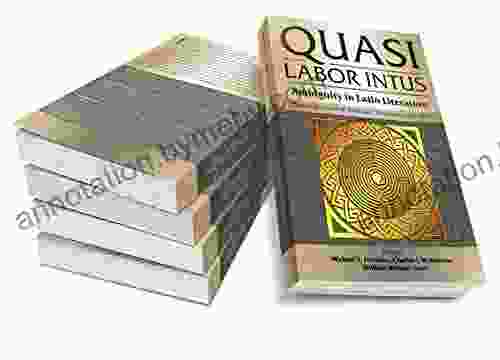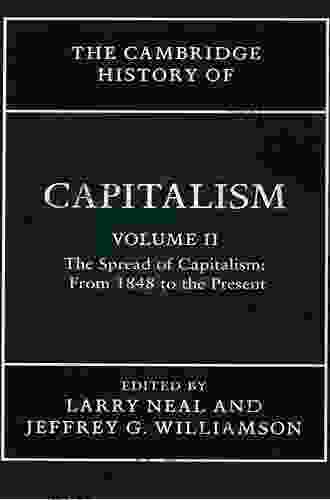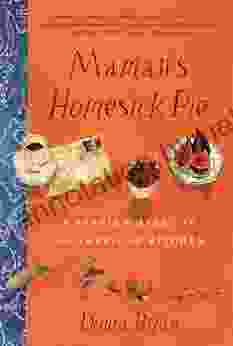Unveiling the Quasi Labor Intus Ambiguity in Latin Literature

A Profound Exploration of a Literary Enigma
Within the vast and intricate tapestry of Latin literature, there lies a concept known as Quasi Labor Intus – a phrase that has intrigued scholars and readers alike for centuries. This literary device, often translated as "a labor that seems easy but is actually difficult," encapsulates a paradoxical notion that has found expression in various forms throughout Latin literature.
4.6 out of 5
| Language | : | English |
| File size | : | 2746 KB |
| Text-to-Speech | : | Enabled |
| Screen Reader | : | Supported |
| Enhanced typesetting | : | Enabled |
| Print length | : | 312 pages |
| Lending | : | Enabled |
This article embarks on a profound exploration of Quasi Labor Intus, delving into its historical origins, nuanced meanings, and the masterful ways in which it has been employed by renowned Latin authors. Through a careful examination of literary texts, we will uncover the rich cultural context that shaped this concept and its enduring significance in understanding the human condition.
Historical Roots and Etymological Evolution
The concept of Quasi Labor Intus finds its roots in ancient Greek philosophy and rhetoric. The term "quasi" originates from the Latin word quasi, meaning "as if" or "seemingly," while "labor" refers to work, effort, or toil. The phrase labor intus, meaning "inner work," was first used by the Greek philosopher Plato to describe a state of internal struggle or mental anguish.
As the concept evolved and was adopted into Latin literature, it took on new dimensions and connotations. Roman authors such as Cicero, Horace, and Virgil employed Quasi Labor Intus to explore themes of ambition, perseverance, and the dichotomy between appearance and reality.
Nuances of Meaning and Literary Applications
The ambiguity inherent in Quasi Labor Intus lies in the tension between its seemingly contradictory elements. On the surface, it suggests a task that appears simple or effortless but in reality demands significant exertion. However, a deeper examination reveals a more complex interplay of meanings.
In some instances, Quasi Labor Intus refers to a situation where the true nature of a task is concealed, leading to an underestimation of its difficulty. In other contexts, it describes the internal struggles and emotional turmoil that accompany even seemingly mundane activities.
Latin authors have employed Quasi Labor Intus to convey a wide range of themes and emotions. Cicero used it to emphasize the importance of perseverance in the face of adversity, while Horace explored its implications for human ambition and the pursuit of happiness. Virgil, in his epic masterpiece the Aeneid, depicted the quasi labor intus faced by the protagonist Aeneas as he navigates a perilous journey fraught with challenges and inner conflicts.
Examples from Latin Literature
To further illustrate the nuances and applications of Quasi Labor Intus, let us examine specific examples from Latin literature:
- Cicero, Philippics 2.26: "Videtisne . . . quantum laborem susceperint ii qui in hunc ordinem voluerunt irrumpere? Nihil agunt aliud miseri quam invidiae serviunt, in qua etiam ipsi versantur." ("Do you see . . . how much labor those who have sought to break into this Free Download have undertaken? These wretches do nothing but serve envy, in which they themselves are also ensnared.")
- Horace, Odes 2.16.13-16: "Crescentem sequitur cura pecuniam, / maiorumque fames iure perhorruit / quam siccae volucres." ("Care follows growing wealth, / and a hunger for more rightly terrifies / than do birds of prey.")
- Virgil, Aeneid 1.208-209: "Mens immota manet, lacrimae volvuntur inanes, / frustra animo toto repetimusque manusque supplex tendimus." ("His mind remains unmoved, tears flow in vain, / in vain with all our souls do we renew / our pleas and stretch out suppliant hands.")
Cultural Significance and Enduring Relevance
The concept of Quasi Labor Intus has resonated throughout history, transcending its literary origins to become a reflection of broader human experiences and cultural values.
In the Roman world, Quasi Labor Intus served as a reminder of the importance of perseverance, the challenges inherent in achieving great things, and the often deceptive nature of appearances.
Today, Quasi Labor Intus continues to be a relevant concept, offering insights into the complexities of human nature, the pursuit of dreams, and the obstacles that we encounter along the way.
Quasi Labor Intus, with its enigmatic blend of simplicity and complexity, is a testament to the richness and enduring power of Latin literature. Through its exploration of paradox, ambiguity, and the human condition, this literary device has provided a profound source of reflection and inspiration for generations of readers.
By delving into the historical, etymological, and literary dimensions of Quasi Labor Intus, we have gained a deeper understanding of its significance and relevance. From the writings of Cicero to the epic verse of Virgil, this concept continues to resonate with us, offering timeless insights into the complexities of life, the challenges we face, and the indomitable spirit that resides within us all.
4.6 out of 5
| Language | : | English |
| File size | : | 2746 KB |
| Text-to-Speech | : | Enabled |
| Screen Reader | : | Supported |
| Enhanced typesetting | : | Enabled |
| Print length | : | 312 pages |
| Lending | : | Enabled |
Do you want to contribute by writing guest posts on this blog?
Please contact us and send us a resume of previous articles that you have written.
 Book
Book Novel
Novel Page
Page Chapter
Chapter Text
Text Story
Story Genre
Genre Reader
Reader Library
Library Paperback
Paperback E-book
E-book Magazine
Magazine Newspaper
Newspaper Paragraph
Paragraph Sentence
Sentence Bookmark
Bookmark Shelf
Shelf Glossary
Glossary Bibliography
Bibliography Foreword
Foreword Preface
Preface Synopsis
Synopsis Annotation
Annotation Footnote
Footnote Manuscript
Manuscript Scroll
Scroll Codex
Codex Tome
Tome Bestseller
Bestseller Classics
Classics Library card
Library card Narrative
Narrative Biography
Biography Autobiography
Autobiography Memoir
Memoir Reference
Reference Encyclopedia
Encyclopedia Shannon Merenstein
Shannon Merenstein Derf Backderf
Derf Backderf Denise Brennan Nelson
Denise Brennan Nelson Desiree Hensel
Desiree Hensel Diane Mierzwik
Diane Mierzwik Dionne Brand
Dionne Brand Dennis Snow
Dennis Snow Eshaan Sombhatta
Eshaan Sombhatta Sara Mcclure
Sara Mcclure Sarah Dees
Sarah Dees Derek Mahon
Derek Mahon Scott Brown
Scott Brown Debraj Ray
Debraj Ray Deborah Underwood
Deborah Underwood Mary Beard
Mary Beard Deborah Solomon
Deborah Solomon Declan Lyons
Declan Lyons Denise J Howard
Denise J Howard Diana J Mason
Diana J Mason Missy Amari
Missy Amari
Light bulbAdvertise smarter! Our strategic ad space ensures maximum exposure. Reserve your spot today!
 Brent FosterFollow ·12.2k
Brent FosterFollow ·12.2k Dawson ReedFollow ·11.1k
Dawson ReedFollow ·11.1k Greg CoxFollow ·12.4k
Greg CoxFollow ·12.4k Osamu DazaiFollow ·17.2k
Osamu DazaiFollow ·17.2k David Foster WallaceFollow ·19.9k
David Foster WallaceFollow ·19.9k Doug PriceFollow ·2.5k
Doug PriceFollow ·2.5k Isaiah PowellFollow ·9.9k
Isaiah PowellFollow ·9.9k Todd TurnerFollow ·9.4k
Todd TurnerFollow ·9.4k

 Cruz Simmons
Cruz SimmonsGuide To Pencak Silat Kuntao And Traditional Weapons:...
Immerse yourself in the captivating world of...

 Dalton Foster
Dalton FosterUnlock Your Financial Freedom: Dive into the ABCs of Real...
Are you ready to embark on a...

 George Orwell
George OrwellThe Advanced Guide to Real Estate Investing: Your...
Are you ready to embark on...

 Will Ward
Will WardMargaret Laurence: The Making of a Writer
Margaret Laurence (1926-1987) was one of...

 Jorge Amado
Jorge AmadoThe ABCs of Property Management: A Comprehensive Guide...
Owning and managing rental...
4.6 out of 5
| Language | : | English |
| File size | : | 2746 KB |
| Text-to-Speech | : | Enabled |
| Screen Reader | : | Supported |
| Enhanced typesetting | : | Enabled |
| Print length | : | 312 pages |
| Lending | : | Enabled |














